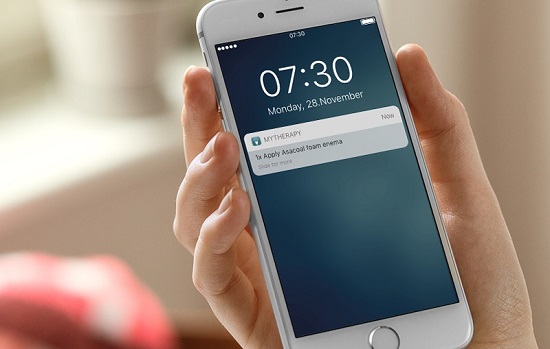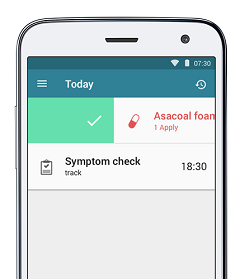Controlling Crohn’s Disease: Track Your Symptoms and Prevent Relapses with an App
Although Crohn's Disease Is a Chronic Condition That Currently Has No Cure, It Is Possible to Manage the Condition Effectively by Adhering to Medication

Crohn’s disease is a type of inflammatory bowel disease (IBD). It causes diarrhea and abdominal pain and can lead to life-threatening complications, such as a narrowing of the intestine (strictures) and fistulas. The severity and the symptoms of the disease vary between patients. However, most people will experience periods of remission followed by periods where the symptoms flare up again. With the right medication and diet, it is possible to maintain these periods of remission. However, adhering to medication and monitoring food intake can be challenging. Medication reminder and health tracker apps, like MyTherapy, can therefore be a useful and practical tool in this context.
MyTherapy, a medication reminder and health tracker smartphone app, is designed for those living with chronic illnesses like Crohn’s disease. The app generates medication reminders that tell you exactly how and when to take your medication. The various drugs, such as anti-inflammatories and immunosuppressants in the case of Crohn’s disease, can be easily uploaded by scanning the barcode of the packaging with the app’s built-in scanner. Alternatively, you can also upload your medication via the app’s built-in databases or manually. On top of this reminder function, MyTherapy also includes an integrative health journal. With this journal, you can monitor your symptoms, medication side-effects, and any other health-related information important to you. Furthermore, any information that you record in the app can be printed out in the form of a monthly report, which you can share with your doctor. This means that you can easily monitor your condition over a long period of time and, together with your doctor, find the drug therapy that best suits your needs. The health journal also makes it possible to track your diet and identify the foods that exacerbate your symptoms. MyTherapy is constantly updated through user-feedback, making the app easy to understand and simple to use. Therefore, the app can be used by patients of any age living with Crohn’s disease.
Symptoms of Crohn’s Disease
Crohn’s disease is a type of inflammatory bowel disease. This means that it causes inflammation of the lining of the digestive tract and can affect any area from the mouth to the rectum. However, it usually occurs in the last part of the small intestine (also known as the ileum) or large intestine (also known as the colon). The part of the digestive tract that is inflamed varies from person to person. The inflammation spreads into the deep tissue layers and can be painful and debilitating and can lead to life-threatening complications.
The symptoms of Crohn’s disease differ from patient to patient and can be anything from mild to severe. Usually the signs develop gradually. However, it is also possible for a dramatic onset of Crohn’s disease. In an active state, Crohn’s disease may involve the following symptoms:
- Diarrhea
- Abdominal pain
- Fever and fatigue (extreme exhaustion)
- Unintended weight loss
- Blood in the stool
People, who suffer from a severe form of Crohn’s disease, may also experience inflammation of the skin, eyes, joints, liver, or bile duct. In children, the disease may cause delays in growth and sexual development. In some cases, people with Crohn’s disease have long periods where the symptoms are absent. This is called remission. Often periods of remission are followed by a flare-up of symptoms and the disease becomes particularly debilitating.
There is no single test that confirms the diagnosis of Crohn’s disease. If your doctor suspects that you suffer from Crohn’s disease, he or she will try and eliminate other potential causes of your symptoms. This is done by asking you about your medical history, diet, recent travel, current medication, and doing physical examinations. Your doctor is also likely to conduct various tests, such as:
- Blood tests to eliminate other potential problems such as anemia
- Stool tests to detect blood in your stool
- A colonoscopy to examine the inside of your colon
- CTE or MRE scans to view specific areas of your tissues and organs
After the doctor has run through these tests and ruled out any other potential conditions that may cause your symptoms, he or she may diagnose Crohn’s disease.
What Causes Crohn’s Disease?
It is not entirely clear what causes Crohn’s disease. There are probably various factors that play a role. For example, genes may increase the risk of developing the disease. Research has shown that up to 20 percent of patients have a close relative with the disease. The inflammation may also be due to an abnormal immune response where the body attacks the cells of the digestive tract while it is trying to fight off an invading microorganism. There are also various risk factors that increase the chance of people developing Crohn’s disease. These include smoking, age, or living in urban areas of industrialized countries.
It is estimated that Crohn's disease affects about 1 in every 650 people in the UK. In the US, there are 780,000 people living with the disease. People of all ages can develop the disease, but it usually develops between the ages of 16 and 30 or 60 and 80. Women have a slightly higher chance of developing Crohn’s disease than men, but in children, the case is reversed where more boys are affected than girls.
Treatment Options
Currently, there is no cure for Crohn’s disease, but it can be managed effectively by reducing symptoms and maintaining periods of remission. In most cases, this is achieved by drug therapy, but surgery may be necessary in more severe cases. Several types of drugs exist to reduce and manage the symptoms of Crohn’s disease. They vary in their strength and area of effectiveness and some may come with side effects. For this reason, you should always consult your doctor who will help you find the drug therapy that is best suited to your needs. Some of these drugs include:
- Anti-inflammatory drugs. These are often the first line of treatment for inflammatory bowel diseases. They include oral 5-aminosalicylates, which are particularly helpful in treating the disease in the small intestine, and corticosteroids, which can reduce inflammation throughout the body.
- Immunosuppressants. In cases where Crohn’s disease is caused by an overactive immune system, immunosuppressants may be prescribed. These weaken the body’s immune system, thereby reducing the symptoms. Popular immunosuppressants include azathioprine and mercaptopurine.
- Antibiotics may be prescribed to reduce the amount of drainage and heal fistulas and abscesses. Some doctors believe that antibiotics help reduce harmful intestinal bacteria, which may be partly responsible for triggering inflammation.
- In severe cases of the disease, the doctor may consider biological therapies. These are a form of powerful immunosuppressant drugs, which are created using naturally occurring antibodies or enzymes to prohibit the growth of proteins.
Some people living with Crohn’s disease may have to undergo surgery, which is often referred to as a resection. During this surgery, the doctor removes the damaged part of the intestinal tract and then reconnects the healthy sections. Alternatively, the doctor may perform an ileostomy where he or she temporarily diverts digestive products away from the inflamed areas of the large intestine to give it time to heal. However, the benefits of surgery may only be temporary and the disease often reoccurs. Therefore, it is important to continue with the drug therapy after surgery.
In addition to medications and surgery, there is some evidence that diet may play a role in the development of the disease. It may be useful to keep a food diary to identify which types of foods make the symptoms worse so that they can be avoided.
Controlling Crohn’s: Start MyTherapy and Improve the Quality of Your Life
Adhering to medication and monitoring diet and symptoms are essential for minimizing the symptoms of Crohn’s disease – even after surgery. For this reason, smartpatient developed the app MyTherapy. The app can be adapted to the specific needs of every patient. It generates medication reminders so that adhering to medication is turned into a simple everyday to-do list. Moreover, the built-in health journal makes it possible to track the symptoms of the disease and the side-effects of medication, which helps your doctor create a drug therapy that is best suited to your needs. The health journal also makes it possible to track your diet and identify the foods that may aggravate your symptoms. Together, these features make MyTherapy a valuable companion in managing Crohn’s disease, paving the way for maintaining periods of remission for as long as possible. In this way, the app can help you lead a relatively normal and symptom-free life.


